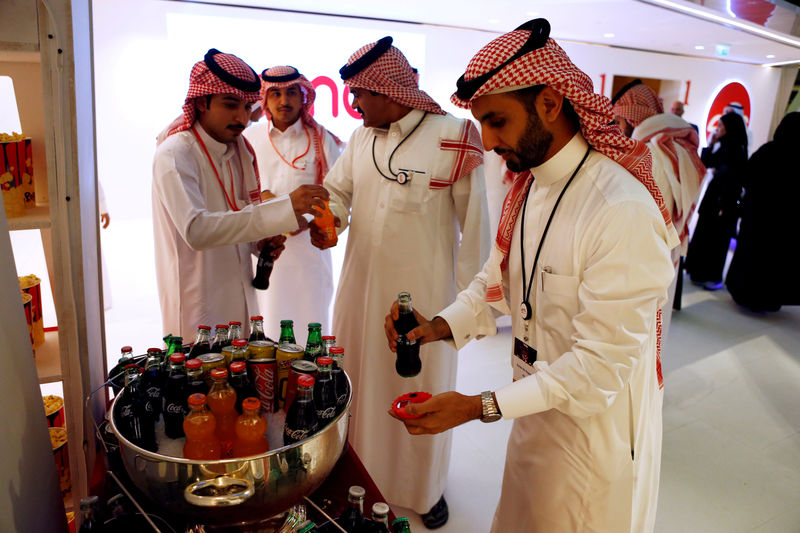By Tom Arnold and Marwa Rashad
DUBAI/RIYADH (Reuters) - Saudi Arabia's malls and bazaars are changing as retailers embrace a shift in shopping habits brought about by reforms to diversify the economy away from oil.
Designer clothes stores and high-end chocolate and flower shops are shutting and fast-fashion, fast-food, budget stores and cinemas are moving in.
Cuts to electricity and petrol subsidies and a rise in VAT have eaten into household budgets and many are making savings by switching from luxury to budget goods.
At the same time, reforms to bring women into the work force and encourage entertainment has lifted other types of spending. The departure of thousands of foreign workers has hurt local bazaars and led to other changes.
The reforms are part of Crown Prince Mohammed bin Salman's push to wean the economy off oil. He wants to create 1.2 million jobs for Saudis by 2022, with many in the retail sector.
"People are opting for budget goods and reforms enabling the re-opening of cinemas, greater recreational activities, as well as women being allowed to drive, may mean there is a shift in how consumers are spending," said Jason Tuvey, an analyst at Capital Economics.
Saudi retail giants such as Fawaz Abdulaziz Alhokair Co (SE:4240) and Savola Group (SE:2050) are having to adapt.
“Retailers are reviewing their portfolios, be it products or stores, to reflect changing consumer patterns," said an executive of one major Saudi retailer.
Alhokair closed over 200 stores in the 12 months to end-June but it also added 70 to 80 stores over the same period. It plans to close a further 55 stores this financial year while adding another 60, according to a source familiar with the matter.
The shift is partly aimed at bringing more affordable brands to shopping malls, that source said. A spokesman for Alhokair did not respond to a request for comment.
The company has the Saudi license for the Zara fast-fashion chain, part of Spain's Inditex (MC:ITX) group, and plans to increase the number of stores to 45 by 2020 from around 30. It also opened the first Saudi branch of Inditex's affordable store Lefties last year.
One of Alhokair's businesses also recently secured a $1.9 billion loan to be used in part to build new malls. The company has not detailed how it will fill those malls, but bankers expect them to include more entertainment offerings, such as cinemas and restaurants, in addition to stores.
The kingdom lifted a nearly 40-year ban on cinemas earlier this year to create an entertainment sector from scratch.
MORE WOMEN WORKERS
Overall consumption, which accounts for about 40 percent of gross domestic product, has stayed robust, averaging 4 percent a year in the past five years, despite the reforms.
Consumer spending weakened at the start of this year as the utility price rises took effect but higher prices for oil exports left room in the budget for bonuses and one-off payments for lower income families and spending has picked up.
Most analysts expect growth to continue for the next few years, partly due to women entering the work force after a female driving ban was lifted in June. The pace of growth is expected to be weaker than in the past decade, however.
The changes are proving challenging for retailers. Alhokair is one of six of Saudi Arabia's 10 major retail firms which registered lower net profit in the quarter ending June 30. Five posted lower sales.
Food and retail conglomerate Savola Group (SE:2050) shut seven supermarkets and two other stores in the second quarter in a plan to reduce its retail selling space by 3.8 percent
But then in May it bought a majority stake in a frozen foods processing firm. Analysts have said that could reflect an anticipation of increased demand for frozen food if women abandon traditional homemaker roles to go to work.
BAKERY SALES DOWN
The departure of some 700,000 foreigners has also had an impact.
Almarai's (SE:2280) sliced bread sales were partly dented by the departure of expatriates. That helped drag down its second quarter bakery sales by 8 percent from the same period in 2017.
"There is a change taking place in this country and you cannot do change without pain," Georges Schorderet, CEO of major Saudi food producer Almarai (SE:2280) said on an earnings call last month.
"I'm not expecting a better business environment in the short to medium term."
Businesses in Saudi Arabia's bazaars have taken a hit. In Riyadh's Batha bazaar, a popular shopping destination for Asian expatriates, business has slowed.
"Business was very good when I first came here. But now you spend days without a single customer buying anything," said 43-year-old Bilal, who runs a small eyewear and watch shop.
He said a lot of his customers were expatriates like him who are leaving Saudi Arabia. He will soon return to Bangladesh.
As of September, Saudis must make up 70 percent of the workforce in 12 retail areas including selling furniture, car spare parts, sweets, watches and eyeglasses.
The goal is to push more Saudis to work in a sector they have long shunned because of its perceived low pay but it may also mean extra training and recruitment costs for retailers.
L'azurde Company for Jewelry and Alhokair have said their operating costs could rise due to the "Saudization" of the sector.
The government also plans to ease restrictions on e-commerce, an area where Saudi Arabia trails other Gulf countries.
This could bring further change to the sector.

"The country’s young population, high connectivity rates and advanced infrastructure are projected to propel the growth of e-commerce sales over the next several years," said yStats.com, an e-commerce intelligence firm.